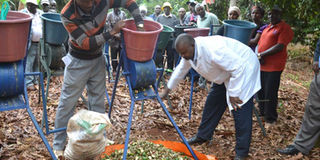Dehusking macadamia nuts made easy, cheaper

Peter Mwathi in his farm in Gichira, Nyeri County demonstrates how his simple macadamia dehusker works. The dehusker projects to reduce farmers workload by over 60 percent. PHOTO | IRENE MUGO | NATION MEDIA GROUP
What you need to know:
- The manually operated machine dehusks 200 to 500kg of nuts per day
- The husks are high in sugar and gum and if not removed early enough, they attract mould reducing quality of the nut.
- Macadamia nuts are used to make butter, cooking oil and cosmetic products such as soaps and shampoos.
- A good innovation must be simple to be attractive to farmers as it can be easily transported and used without spending more.
The weather is chilly as Seeds of Gold team ventures into Peter Mwathi’s macadamia farm in Gichira, Nyeri County.
It is currently the harvesting season in Nyeri and other neighbouring counties where the crop is grown, including Embu, Kirinyaga, Meru and Murang’a.
Wearing a white apron, Mwathi is surrounded by a group of farmers on his two acres as he demonstrates how to use a dehusker he has fabricated.
Traditionally, after harvesting the produce, farmers collect the nuts in a sisal sack and hire men to thump them to remove the husks.
Mwathi’s machine, however, does the work effortlessly, reducing the workload by over 60 per cent as it removes the husks 24 hours after harvesting to prevent deterioration.
The husks are high in sugar and gum and if not removed early enough, they attract mould reducing quality of the nut.
His machine is made of metal, a mortar and a wheel which rotates squeezing the nuts to separate them from the husks.
At the top, a plastic bucket with an opening at the bottom is fixed against the mortar where the nuts are filled for dehusking.
On the side is a metallic knob that a farmer rolls to push the mortar to remove the husk off the nuts. Mwathi, an agricultural economist trained at Egerton University, says he was inspired to fabricate the machine last year due to the need to eliminate the tedious process of dehusking macadamia nuts.
“Being a macadamia farmer, I knew the challenge of dehusking the nuts and worked on an easy and cheaper way to do the task,” he says. For now, his machine is manual but he says he is working on making it electric for more efficiency.
The chairman of Mt Kenya Macadamia Association, which brings together 50 members, notes the machine is currently going for Sh5,500. On the other hand, prices of imported machines range between Sh60,000 and Sh70,000.
SHOULD NOT COMPROMISE EFFICIENCY
“The machine can dehusk 200 to 500kg of nuts per day. We are leasing it to farmers at Sh200 each day,” he says, adding farmers sell a kilo of the nuts to Jungle Nuts Company at Sh120.
On the other hand, farmers hire people to dehusk and sort the nuts at ShSh300 per day.
Mwathi, who has 60 mature trees that produce 2,000kg of nuts per year, says macadamia is the new frontier especially as fortunes dwindle in coffee and tea, once the main cash crops in Mt Kenya.
Macadamia nuts are used to make butter, cooking oil and cosmetic products such as soaps and shampoos.
David Waweru, a senior technologist at Jomo Kenyatta University of Agriculture and Technology’s School of Engineering, says a good innovation must be simple to be attractive to farmers as it can be easily transported and used without spending more.
“In the case of the simple de-husking machine, the waste material from the process can still be used in making briquettes and compost manure to improve soil health.”
Edwin Mwango, an agricultural engineer in Nyeri, notes that for such a machine, what matters is the speed at which it dehusks the nuts, the likelihood of breaking them, allowance of nut size given that some macadamia are big in size and weight.
“The farmer is also supposed to look out for the moisture content of the nuts, which should average 4 per cent to enable them to crack easily. The cost of production of the machine should not compromise efficiency and agronomic values,” says Mr Mwango.
Additional reporting by Brian Okinda.





